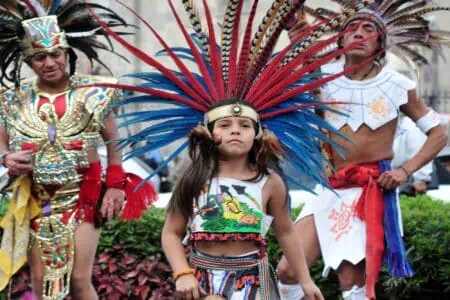The ancient Aztecs were a fantastic culture, famous for their agricultural practices, art, and architecture. Choosing among these Aztec names for your son or daughter could greatly honor this indigenous Mesoamerican civilization.
Aztec baby names are complex, often having powerful meanings in Nahuatl (the Aztec language). We have collected a plethora of traditional Aztec names for boys and girls rooted in Aztec culture, history, and mythology. We hope you find the perfect name for your little prince or princess!
103 Beautiful Aztec Baby Names
Discover these gorgeous Aztec names with indigenous roots.
Acamapichtli
Acamapichtli is an important figure in Mesoamerican history, as the first Tlatoani (AKA king) or the Aztecs of Tenochtitlan – a city-state located in present-day Mexico City. This powerful name is well-suited for a future leader.
- Origin: Nahuatl
- Meaning: A handful of reeds
- Pronunciation: a-ka-ma-PEECH-chee
- Variations: Acamapich, Ācamāpichtli
- Namesakes: Acamapichtli, the first king of the Aztecs of Tenochtitlan, who founded the Aztec imperial dynasty.
Acatl
Acatl was a common personal name among the Aztecs, meaning “reed” or “cane.” Reeds were used by the indigenous people to make darts and arrows, giving Acatl a warrior association. Acatl is also a day on the Aztec calendar, associated with the god of the night sky, Tezcatlipoca.
- Origin: Nahuatl
- Meaning: Reed
- Pronunciation: ah-CAT
Ahuiliztli
Ahuiliztli is a happy option among our Aztec names for girls and boys, derived from a Nahuatl word meaning “joy,” “pleasure,” “enjoyment,” or “recreation.” A perfect name for a smiley baby who brings joy to your heart.
- Origin: Nahuatl
- Meaning: Joy
- Pronunciation: A-wee-LEE-stlee
Ahuitzotl
Ahuitzotl is derived from the Nahuatl “atl” (water) combined with “huitzotl” (porcupine), referencing the otter. Unlike many other cultures, the ancient Aztecs didn’t believe otters were cute, harmless creatures. Instead, they thought they were monsters from the deep who would harm fishermen who ventured too far. Ahuitzotl is an excellent option for a boy who is tougher than he appears.
- Origin: Nahuatl
- Meaning: Otter
- Pronunciation: Ah-weet-zee-ot
Ameyalli
Ameyalli is derived from the Nahuatl words “atl” (water) combined with “mēya” (to flow), referencing a place where water wells. Ameyalli is a beautiful nature name for a girl who loves spending time by the water.
- Origin: Nahuatl
- Meaning: Fountain
- Pronunciation: ah-me-yal-lee
Atotoztli
Atotoztli is a powerful option among our Aztec girl names, associated with the daughter of Aztec emperor Moctezuma I. Atotoztli became queen regent, ruling over the Aztecs for up to 30 years. Atotoztli is derived from the Nahuatl elements “atl” (water) combined with “toztli” (yellow parrot), appealing to animal lovers.
- Origin: Nahuatl
- Meaning: Water parrot
- Pronunciation: a-to-TO-schee
- Namesakes: Atotoztli, a daughter of the Aztec emperor Moctezuma I and his queen consort Chichimecacihuatzin I.
Ayauhcihuatl
Ayauhcihuatl’s etymology is uncertain, thought to be derived from the Nahuatl “ayahuitl” (fog) and “cihuatl” (woman, wife). This was the name of an empress of Tenochtitlan and wife of famed ruler Huitzilihuitl. Ayauhcihuatl is well-suited for a modern-day queen, too.
- Origin: Nahuatl
- Meaning: Fog woman
- Pronunciation: ah-ya-uh-see-wat
Aztlan
Aztlan is the mythical homeland of the Aztecs, believed to have a large population of birds. The meaning of Aztlan is unclear, possibly “place of the herons” or “place of whiteness.” Herons were sacred birds to the Aztecs, associated with Tlaloc – the god of rain, water, and agriculture. Aztlan is a meaningful option for a child with indigenous roots.
- Origin: Nahuatl
- Meaning: Place of the heron
- Pronunciation: AS-tl-an
- Variations: Aztlán
Cacamacihuatl
The meaning of Cacamacihuatl is uncertain, thought to be derived from the Nahuatl elements “cacamatl” (small corn cob, small ear of corn) and “cihuatl” (wife, woman). This was the name of a Queen of Tenochtitlan, the mother of Tlacaelel – the principal architect of the Aztec Triple Alliance, combining three Nahuta city-states.
- Origin: Nahuatl
- Meaning: Wife of corn
- Pronunciation: kah-kah-mah-see-wat
- Namesakes: Cacamacihuatl, a Queen of Tenochtitlan and wife of King Huitzilihuitl.
Centeotl
Centeotl is a mythical option among our Aztec baby names, associated with the son of the earth goddess Tlazolteotl and the solar deity Piltzintecuhtli. Centeotl was the god of maize and subsistence, viewed as an essential deity by the Aztecs, given the importance of corn for sustaining life. Centeotl is an excellent baby name for a family with a background in farming.
- Origin: Nahuatl
- Meaning: Maize cob lord, the dried ear of the maize god
- Pronunciation: Zin-tay-AH-tul
- Variations: Cinteotl, Centeocihuatl
Chalchiuhtlicue
Chalchiuhtlicue is derived from the Nahuatl “chālchihuitl” (jade) combined with “cuēitl” (skirt). Chalchiuhtlicue was the Aztec goddess of water, rivers, and fertility. She was also the patroness of childbirth. This auspicious baby name could ensure a safe delivery.
- Origin: Nahuatl
- Meaning: Jade Skirt
- Pronunciation: cash-chew-CHEE-kweh
- Variations: Chalciuhtlicue, Chalchiuhcueye, Chalcihuitlicue
Chantico
Chantico was a traditional Aztec goddess of fires in the family hearth. She was turned into a dog by the creator god Tonacatecuhtli when she broke her fast during a religious celebration, leading to the nickname “Nine Dogs.” Babies born on the ninth day of the trecena (a 13-day period on Mesoamerican calendars) were considered unlucky, given the association to Chantico. Your little Chantico could change the name’s luck.
- Origin: Nahuatl
- Meaning: She who dwells in the house
- Pronunciation: chan-TEE-ko
Chichimecacihuatzin
Chichimecacihuatzin is a complex Aztec baby name with seven syllables. It was popular among indigenous Mexicans, born by several rulers. The most notable was Chichimecacihuatzin I, an Aztec queen consort of Tenochtitlan whose daughter shared the same name.
- Origin: Nahuatl
- Meaning: Inhabitants of Chichiman
- Pronunciation: CHEE-CHEE-meh-kah-see-wat-sin
- Namesakes: Chichimecacihuatzin II, an Aztec princess of Tenochtitlan in Mexico.
Chicomecoatl
Chicomecoatl is derived from the Nahuatl “chicome” (seven) combined with “coatl” (snake). This was the Aztec goddess of food, drink, harvest, and famine. Chicomecoatl could be benevolent or harmful by causing a good or bad harvest. Your little Chicomecoatl could take on the goddess’s good characteristics by choosing to benefit society.
- Origin: Nahuatl
- Meaning: Seven serpent
- Pronunciation: chee-ko-meh-KO-ach
Chimalma
Chimalma is derived from the Nahuatl “chīmalli” (shield) combined with “māitl” (hand). In Aztec mythology, Chimalma was a goddess and mother of Quetzalcoatl, the god of culture, and Xolotl, the god of lightning. She got her name after the hunting god, Mixcoatl, couldn’t approach her and became angry. He shot five arrows at Chimalma, which she caught with her hands.
- Origin: Nahuatl
- Meaning: Shield hand
- Pronunciation: cheem-AL-mah
- Variations: Chīmalmā
Chimalpahin
Chimalpahin was a prominent Nahua historian who compiled information on early Mexican civilizations based on testimony from the indigenous people. His annals cover the years between 1589 and 1615, listing indigenous kings, Spanish archbishops, and inquisitors. This fascinating name is perfect for history lovers.
- Origin: Nahuatl
- Meaning: He ran with a shield
- Pronunciation: chee-mal-PINE
- Namesakes: Chimalpahin, a Nahua historian who wrote about the history of Mexico.
Cipactli
Cipactli is the Aztec word for “crocodile,” “alligator,” or “monster.” In Aztec mythology, Cipactli was a part-crocodile part-fish sea monster with mouths all over its body. The creator god Tezcatlipoca captured the sea monster using his foot as bait, creating the world from its body. Cipactli is a perfect name for mythology lovers.
- Origin: Nahuatl
- Meaning: Crocodile
- Pronunciation: see-PAC-tli
Citlali
Citlali is one of the shortest Aztec girl names on our list, making it more usable in modern times. Today, it’s sometimes given to girls in Mexican and Latin communities. Your little girl will shine brightly with a distinctive name like Citlali!
- Origin: Nahuatl
- Meaning: Star
- Pronunciation: seat-CHAL-lee
- Variations: Citlalli, Citlalti
Citlālicue
Citlālicue hails from Aztec mythology, born by a goddess who created the stars, the milky way, and darkness along with her husband, Citlalatonac. This ancient title is rarely used in modern times, helping your daughter stand out. Citlālicue’s celestial meaning adds to its appeal.
- Origin: Nahuatl
- Meaning: Star garments
- Pronunciation: sita-LEE-kway
- Variations: Citlālinicue
Coanacochtzin
Coanacochtzin is a perfect name for a tribal leader, associated with the last tlatoani (ruler) of the Aztec city-state Texcoco before the Spanish took it over. Coanacochtzin is ancient and powerful, giving your son a sense of power and authority.
- Origin: Nahuatl
- Meaning: Unknown
- Pronunciation: ko-an-ah-COCH-tsin
- Variations: Cohuanacochtzin, Coanacochtli, Coanacoch
- Namesakes: Coanacochtzin, the last ruler of the Aztec city-state of Texcoco before it went under Spanish control.
Coatlicue
Coatlicue is derived from the Nahuatl “cōātl” (snake) combined with “cuēitl” (skirt). In Aztec mythology, Coatlicue was a creator goddess who gave birth to the moon, stars, and Huītzilōpōchtli – the god of the sun and war. Coatlicue is a beautiful name for a future creator.
- Origin: Nahuatl
- Meaning: Snake skirt
- Pronunciation: kwaht-LEE-kway
Coyolxauhqui
Coyolxauhqui is a complex option among our Aztec names for girls, rarely used in modern times. In Aztec mythology, Coyolxauhqui was the goddess of the moon. She led her brothers in an attack against their mother, Coatlicue, when they found out she was pregnant. Her name is derived from the Nahuatl “coyolli” (bell) and “xuah” (face painting, painting).
- Origin: Nahuatl
- Meaning: Painted with bells
- Pronunciation: ko-yosh-SHAW-kee
- Variations: Coyolxāuhqui
Coyotl
Coyotl is the Nahuatl word for “coyote” – a wolf-like animal indigenous to Canada, the U.S., and Mexico. While coyotes are often viewed negatively in modern society, they were sacred to the Aztecs, symbolizing wisdom, pragmatism, youth, and masculine beauty. Your little Coyotl could be as bright and adaptable as the animal!
- Origin: Nahuatl
- Meaning: Coyote
- Pronunciation: COY-ote
Cuauhtemoc
Cuauhtemoc is a tribal Aztec name derived from the Nahuatl “cuāuhtli” (eagle) and “temo” (descend). Eagles were associated with warriors in Aztec society, symbolizing bravery, strength, and fearlessness. Your son, Cuauhtemoc, could be as powerful as this magnificent bird.
- Origin: Nahuatl
- Meaning: Descending eagle
- Pronunciation: kyoo-AU-tuh-maak
- Variations: Cuauhtémoc
- Namesakes: Cuauhtemoc, the last Aztec emperor who was executed by Spanish conquistador Hernán Cortés.
Cuauhtlequetzqui
Cuauhtlequetzqui was the third ruler of the Mexica – a Nahuatl-speaking indigenous people from the Valley of Mexico. He was most famous for his role in the war against the Texcaltepeca-Malinalcas, where he captured the enemy leader, Copil, and his daughter, Xicomoyahual, whom he made his wife. Cuauhtlequetzqui is a badass name for a future leader.
- Origin: Nahuatl
- Meaning: Rising eagle
- Pronunciation: kwal-kue-KET-key
- Variations: Cuauhtliquetzqui, Quauhtlequetzqui
- Namesakes: Cuauhtlequetzqui, an Aztec ruler from 1116-1153 who became lord over Chapoltepec.
Ehecatl
Ehecatl was a Mesoamerican god of the wind. He was also a benevolent creator god believed to have stolen bones from the Underworld to create humans. Ehecatl blessed humanity with the maguey plant – an important food and medicine for the ancient Aztecs. Your little Ehecatl’s compassion could also benefit humankind.
- Origin: Nahuatl
- Meaning: Wind
- Pronunciation: eh-HEY-cat
Eloxochitl
Eloxochitl means “magnolia” in Nahuatl, referencing a species of flowering plants with large, fragrant flowers. This elegant title was exclusively given to males. Another form, Eloxvch, was given to females. Eloxochitl could be a lovely choice for a baby who will “bloom” into a kind-hearted human.
- Origin: Nahuatl
- Meaning: Magnolia
- Pronunciation: ey-low-SO-cheat
- Variations: Eloxvch
Huacaltzintli
Huacaltzintli is a royal title associated with the Queen of the ancient city-state of Tenochtitlan and the wife of Aztec emperor Itzcoatl. This elegant title could be a lovely choice for a modern-day princess.
- Origin: Nahuatl
- Meaning: Beloved carrying cage
- Pronunciation: hwah-kahl-TSINT-li
- Namesakes: Huacaltzintli, an Aztec princess of Tlatelolco and queen of Tenochtitlan.
Huehue
Huehue is a traditional Aztec title given to an elder or a wise older man. It was also a personal name chosen for wise boys beyond their years. Perhaps your little Huehue’s best trait could be his deep internal wisdom.
- Origin: Nahuatl
- Meaning: The elder
- Pronunciation: WAY-WAY
Huehuecoyotl
Huehuecoyotl is an exciting choice among our Aztec names for boys, derived from the Nahuatl “huēhueh” (very old) combined with “coyōtl” (coyote). It was associated with an early Mesoamerican god of music, dance, and song, who enjoyed playing pranks on the other gods. He was also a big partier who would cause mischief among humans to relieve his boredom. Huehuecoyotl is an excellent option for a boy who is the life of the party.
- Origin: Nahuatl
- Meaning: Very old coyote
- Pronunciation: WAY-WAY-COY-ote
- Variations: Ueuecoyotl
Huitzilihuitl
Huitzilihuitl is a powerful option for your little warrior, associated with an Aztec king who ruled over Tenochtitlan in present-day Mexico City. Huitzilihuitl was a skilled politician who allied with neighboring groups and expanded his city’s weaving industry. Choosing Huitzilihuitl for your son could make him an influential leader.
- Origin: Nahuatl
- Meaning: Hummingbird feather
- Pronunciation: weet-see-WEET-uhl
- Variations: Huitzilihuitzin,Uitziliuitl, Vytzilihuitl
- Namesakes: Huitzilihuitl, the second king of Tenochtitlan from 1390 to 1415.
Huitzilopochtli
Huitzilopochtli is derived from the Nahuatl “huitzilin” (hummingbird) combined with “ōpōchtli” (left, south). In Aztec mythology, Huitzilopochtli was the god of the sun and war, represented in artwork as a hummingbird or eagle. Your son will fly high with a unique name like Huitzilopochtli.
- Origin: Nahuatl
- Meaning: Left side of the hummingbird
- Pronunciation: weet-see-luh-POWCH-tuh-lee
Huixtocihuatl
In Aztec mythology, Huixtocihuatl was the goddess of fertility. She was also the patron of salt and salt water and is believed to have discovered the substance. This ancient name is beautiful yet complex—a distinctive choice for a girl with Nahua heritage.
- Origin: Nahuatl
- Meaning: Salt lady
- Pronunciation: weesh-toe-SEE-wat
- Variations: Uixtochihuatl, Uixtociuatl
Iccauhtli
Iccauhtli is an appealing option among our Aztec names for boys, often chosen for a “younger brother.” Iccauhtli could be a sweet name to honor the strong bond between brothers.
- Origin: Nahuatl
- Meaning: Younger brother
- Pronunciation: ikka-ca-wall-eh-tlee
- Variations: Iccāuhtli
Ilancueitl
Ilancueitl is an elegant option among our Aztec names for girls, associated with the first queen of Tenochtitlan – a large city-state located in present-day Mexico City. Your little Ilancueitl could be as important and influential as this historical figure.
- Origin: Nahuatl
- Meaning: Old woman skirt
- Pronunciation: ih-lan-KWE-eet-uhl
- Namesakes: Ilancueitl, the first queen of Tenochtitlan, located in present-day Mexico City.
Itzcoatl
Itzcoatl is derived from the Nahuatl “itztli” (obsidian) combined with “cōātl” (snake). The name was born by the fourth king of Tenochtitlan and the first ruler of the Aztec Empire. This tribal name gives off power and authority, making it an awesome choice for a future leader.
- Origin: Nahuatl
- Meaning: Obsidian snake
- Pronunciation: is-KO-at
- Namesakes: Itzcoatl, the fourth king of Tenochtitlan and the founder of the Aztec Empire.
Itzpapalotl
Itzpapalotl is derived from the Nahuatl “itztli” (obsidian) combined with “pāpālōtl” (butterfly). In Aztec myths, Itzpapalotl was a skeletal warrior goddess and queen of Tamoanchan – a paradise where the gods created the first humans. Itzpapalotl could be a badass option for your little goddess.
- Origin: Nahuatl
- Meaning: Obsidian butterfly
- Pronunciation: eets-pa-PA-loch
- Variations: Ītzpāpālōtl
Ixtlilxochitl
Ixtlilxochitl is derived from the Nahua words “Ixtli” (face), “tliltic” (black), and “xochitl” (flower). This elegant title was born by a ruler of Tetzcoco – a major city-state in Mesoamerica during pre-columbian times. Ixtlilxochitl’s poetic meaning and powerful sound make it one of the most appealing Aztec names for boys.
- Origin: Nahuatl
- Meaning: Dark flower
- Pronunciation: iz-leel-SO-cheat
- Namesakes: Ixtlilxochitl Ome Tochtli, the ruler of the Acolhua city-state of Texcoco and father of the famous “poet-king” Nezahualcoyotl.
Macuilxochitl
Macuilxochitzin was a poet and noble who lived during the height of the Aztec civilization. Macuilxochitl was highly intelligent, said by others to be as “wise and as competent as the king.” Your little Macuilxochitl could be as accomplished as her forebearer.
- Origin: Nahuatl
- Meaning: Five flower
- Pronunciation: mah-koo-el-SO-cheat
- Variations: Macuilxochitzin
- Namesakes: Macuilxochitzin, a poet and daughter of Tlacaélael, a counselor to the Aztec kings.
Malinalli
Malinalli means “braided grass” or “tall grass” – a material used by the Actezs as a building material. This beautiful nature name could be perfect for a little girl who lives spending time outdoors. The cute nickname, Mali, adds to its appeal.
- Origin: Nahuatl
- Meaning: Braided grass
- Pronunciation: mah-lee-NAL-lee
Malintzin
Malintzin is a historical option among our Aztec baby names, derived from the Nahuatl “Malinalli” (grass) combined with the honorific suffix “tzin” (ma’am, lady). Malintzin was a Nahua woman who acted as an interpreter and intermediary for Spanish conquistador Hernán Cortés during his takeover of the Aztec emperor. Malintzin could be an exciting option for history lovers.
- Origin: Nahuatl
- Meaning: Lady of the grass
- Pronunciation: ma-LEEN-tsin
- Variations: Malintzine
- Namesakes: Malintzin, a Nahua woman who acted as an interpreter and advisor for the Spanish during the conquest of the Aztec Empire.
Mapachin
Mapachin is derived from the Nahuatl “māpach” (raccoon, thief), ultimately from “māpachoā” (to seize, to lay hold of, to grab with one’s hands). Raccoons are cute and mischievous animals known for stealing food. Mapachin could be a funny option for your little troublemaker.
- Origin: Nahuatl
- Meaning: Raccoon
- Pronunciation: mah-PACH-in
Matlalxochtzin
Matlalxochtzin is a traditional Aztec name associated with a princess who married a son of Acamapichtli – the founder of the Aztec imperial dynasty. Matlalxochtzin is elegant and poised, making it well-suited for a modern-day princess.
- Origin: Nahuatl
- Meaning: Blue-green feather
- Pronunciation: mat-lal-so-chee-tsin
- Namesakes: Matlalxochtzin, an Aztec princess and daughter of Tlacacuitlahuatzin, ruler of the Tepanec people.
Mayahuel
Mayahuel is derived from the Nahuatl “metl” (agave, maguey) and “yahualli” (encircling, night, divine spirit), together meaning “one who surrounds the maguey” or “the divine spirit surrounded by maguey.” This was a female goddess in Aztec culture who personified the maguey plant. Maguey was essential to the Aztecs, used to make food, medicine, and alcohol. Mayahuel is an awesome name rooted in Aztec traditions.
- Origin: Nahuatl
- Meaning: The divine spirit surrounded by maguey
- Pronunciation: my-YAH-well
- Variations: Meyehual
Mazatl
In Aztec culture, deer, or Mazatl, symbolized sun and drought. They were also associated with the rain god, Tlaloc, who was necessary to end drought and sustain life. Additionally, Mazatl was one of the five Aztec calendar signs, represented by the image of a deer. Deer were essential among indigenous cultures, making Mazatl a meaningful name option to honor this important animal.
- Origin: Nahuatl
- Meaning: Deer
- Pronunciation: MA-zaht
Metztli
Metztli is a mythical choice among our Aztec baby names, associated with a god or goddess of the moon, night, and farmers. The myth goes that the sun and moon were equally bright. The gods feared the two lights would burn the world and threw a rabbit at the moon to darken it, making Metztli. Metztli is an attractive name option for lovers of the night.
- Origin: Nahuatl
- Meaning: Moon
- Pronunciation: METST-lee
- Variations: Meztli, Metzi
Mexitli
Mexitli is derived from the Nahuatl “metl” (agave, maguey) and “zitli” (hare). According to Aztec legend, Mexitli was a legendary warrior and hero who led his tribe out of the ancestral land of Azlan to the Valley of Mexico. During this journey, the war god Huitzilopochtli told the Aztecs they needed a new name for themselves. They decided on “the Mexica,” possibly inspired by their leader, Mexitli.
- Origin: Nahuatl
- Meaning: Agave hare
- Pronunciation: MEKS-eet-lee
- Variations: Mexi, Mezih
- Namesakes: Mexitli, a legendary leader and priest of the Aztecs.
Miahuaxihuitl
Miahuaxihuitl’s meaning is uncertain, possibly derived from the Nahuatl words “miahuatl” (maize in bloom) and “xihuitl” (plant) or “xihuitl” (year). Miahuaxihuitl was the mother of Montezuma I – the second Aztec emperor who expanded the empire during his reign. Your little Miahuaxihuitl could also be the mother of great rulers. Or, perhaps, she’ll become a great ruler herself.
- Origin: Nahuatl
- Meaning: The maize plant in bloom
- Pronunciation: mia-wah-SHE-wit
- Variations: Miyahuaxihuitl
- Namesakes: Miahuaxihuitl, an Actez queen of Tenochtitlan and mother of Emperor Moctezuma I.
Mictecacihuatl
Mictecacihuatl is derived from the Nahuatl words “Mictlan” (the Aztec afterlife) and “cihuātl” (woman, lady). In Aztec mythology, Mictecacihuatl was a goddess of death and the underworld who presided over the ancient festivals of the dead. This name may appeal to fans of the morbid and strange.
- Origin: Nahuatl
- Meaning: Mictlan lady
- Pronunciation: meek-teh-ka-SEE-wat
Mictlantecuhtli
Mictlantecuhtli is a spooky option among our Aztec boy names, associated with the skeletal ruler of Mictlan, the Aztec underworld. Souls who weren’t sent to paradise would have to go through the “nine hells of Mictlan.” At the last level, they would meet Mictlantecuhtli, who would either make them disappear or find rest. Your son, Mictlantecuhtli, could form a deep connection to the world beyond.
- Origin: Nahuatl
- Meaning: Lord of Mictlan
- Pronunciation: muhkt-laan-tuh-KOOT-lee
Mixcoatl
Mixcoatl is derived from the Nahuatl “mixtli” (cloud) combined with “cōātl” (serpent). In many Mesoamerican cultures, Mixcoatl was a god of the hunt and the Milky Way. He was portrayed with a black face with star-like speckles holding a spear, net, or basket. Mixcoatl’s distinctive sound will make your son shine as brightly as the stars in the sky.
- Origin: Nahuatl
- Meaning: Cloud serpent
- Pronunciation: meesht-ko-toe
- Variations: Camaxtl, Camaxtli
Moctezuma
Moctezuma comes from the Nahuatl words “mo” (himself), “tēcu” (lord), and “zōma” (become angry, frown). This title was born by two Aztec emperors. Moctezuma II was emperor when initial contact occurred between the indigenous Mesoamericans and Spaniards. He was killed during the beginning of the Spanish conquest of the Aztec empire.
- Origin: Nahuatl
- Meaning: He becomes angry like a lord
- Pronunciation: maan-tuh-ZOO-muh
- Variations: Motewksomah, Motecuhzomatzin, Montezuma, Moteuczoma, Motecuhzoma, Motēuczōmah, Muteczuma
- Namesakes: Moctezuma II, the 9th emperor of the Aztec empire who ruled from 1502 to 1520.
Namacuix
Namacuix is a royal option among our Aztec baby names, from a Nahuatl word meaning “ruler” or “king.” Namacuix is very rare, with few modern bearers. Its powerful meaning and interesting sound could appeal to unique name lovers.
- Origin: Nahuatl
- Meaning: King
- Pronunciation: naMA-coo-ish
Necuametl
Necuametl is a natural option among our Aztec names, associated with the maguey (AKA agave) plant, which was vital to early Mesoamerican cultures. It may have also been a name for a type of palm. Your little Necuametl could deeply love plants and other living things in the natural world.
- Origin: Nahuatl
- Meaning: A sweet maguey, palm
- Pronunciation: neh-coo-ah-MEET
Nezahualcoyotl
Nezahualcoyotl is a great Aztec name for history lovers, associated with a pre-Columbian scholar, warrior, philosopher, and ruler of the ancient city-state, Texcoco. Unlike other important figures of his time, Nezahualcoyotl wasn’t entirely Mexica (AKA Aztec). He was half Acolhua – a tribal group native to Texcoco. Nezahualcoyotl is best known for his fantastic poetry. Perhaps your little Nezahualcoyotl could also have a way with words.
- Origin: Nahuatl
- Meaning: Fasting coyote
- Pronunciation: ness-AHL-why-COY-ote
- Namesakes: Nezahualcoyotl, a scholar, philosopher, and warrior of the city-state Texcoco in pre-Columbian era Mexico.
Nezahualpilli
Nezahualpilli was a tlatoani (AKA king) of the Mesoamerican city-state Texcoco. He was elected after his father, Nezahualcoyotl, died in 1472. Nezahualpilli was a fair ruler who abolished capital punishment and encouraged scientific discovery. Nezahualpilli is an excellent name for a wise boy with a great temperament.
- Origin: Nahuatl
- Meaning: Fasting prince
- Pronunciation: ness-AHL-wah-peel-ee
- Namesakes: Nezahualpilli, an Aztec king of the city-state of Texcoco from 1473 to 1515.
Ometeotl
Ometeotl is a unique option among our Aztec names for girls and boys, derived from the Nahuatl “ome” (two, dual) and “teōtl” (god). This was a binary god in Aztec mythology composed of Ometecuhtli and Omecihuatl – a husband and wife responsible for creating the universe. This mighty name celebrates the duality of the universe.
- Origin: Nahuatl
- Meaning: Two gods
- Pronunciation: oh-may-TAY-ote
- Variations: Ōmeteōtl
Ometochtzin
Ometochtzin was a part of the Acolhua nobility – an indigenous Mesoamerican people who arrived in the Valley of Mexico around 1200 CE. In Aztec culture, rabbits were associated with the moon and the circle of life, giving Ometochtzin (two rabbits) a deeper meaning.
- Origin: Nahuatl
- Meaning: Two rabbits
- Pronunciation: oh-me-TOCK-see-tsin
- Namesakes: Carlos Ometochtzin, a Tezcocan noble who was executed for his religious practices in 1539.
Ozomatzin
Ozomatzin, also called Tezcacohuatzin, was an ancient king of Cuauhnahuac – the largest city of Morelos in Mexico. Ozomatzin was said to be a magician. In one legend, Ozomatzin used his magical powers to conjure an army of spiders, scorpions, and bats to protect his daughter from a suitor. Choosing Ozomatzin could bless your son with a magical touch.
- Origin: Nahuatl
- Meaning: Unknown
- Pronunciation: OH-SO-mat-sin
- Variations: Tezcacohuatzin, Ozomatzinteuctli
- Namesakes: Ozomatzin, a ruler of Cuauhnahuac, considered one of the most powerful Aztec kings of the 14th-century.
Papantzin
Papantzin is among the most interesting Aztec names for girls, associated with a beautiful Texcocoan princess. Papantzin fell ill, was believed dead, and lay in a tomb. However, the Texcocoan people heard her cries and released her. While in the grave, Papantzin envisioned foreign beings arriving on “floating houses” (ships) from a distant land. She was told they would conquer the Aztecs and bring knowledge of the one true God. Many believed she foretold the coming of the Spanish.
- Origin: Nahuatl
- Meaning: Back of the flag
- Pronunciation: pa-PAN-sin
- Namesakes: Papantzin, a Texcocoan princess and the sister-in-law of Aztec emperor Moctezuma II.
Patecatl
In Aztec mythology, Patecatl was the god of healing, fertility, and peyote – a small cactus with hallucinogenic effects. He was also the god of pulque – an alcoholic beverage made from the agave plant. Patecatl could be an exciting name for mythology lovers.
- Origin: Nahuatl
- Meaning: A person from the place of healing or restoration
- Pronunciation: pah-TAY-cot
Qualpopoca
Qualpopoca was an Aztec warrior and military commander who fought on behalf of the Aztec empire against the Spanish conquistadors. He was one of the few Aztec military commanders to have some success against the Spanish. Any boy named Qualpopoca will surely be tough and have a fighter spirit.
- Origin: Nahuatl
- Meaning: Star with a tail
- Pronunciation: kwal-po-PO-kah
- Variations: Quetzalpopoca
- Namesakes: Qualpopoca, an Aztec administrator and military commander.
Quecholcohuatl
Quecholcohuatl was a Chalca musician – a Nahua people group from central Mexico. The Chalca had been conquered by the Aztecs, who removed their tlatoque (ruler) around 1465. Quecholcohuatl helped reestablish some of Chalca’s independence after he performed a politically-driven song for King Axayacatl in 1479, reinstating their tlatoque. Quecholcohuatl was a hero to his people. Perhaps your son could be one, too.
- Origin: Nahuatl
- Meaning: Flamingo snake
- Pronunciation: kay-cole-KO-wat
- Namesakes: Quecholcohuatl, a Chalcan (pre-Columbian Nahua) musician who helped make peace with the Tenochtitlan and the Axayacatl.
Quetzalcoatl
Quetzalcoatl comes from the Nahuatl “quetzalli” (feather) and “cōātl” (snake). Quetzalcoatl was a major god of sky, wind, knowledge, and the morning star in Mesoamerican myths. Among the Aztecs, he was the patron of books, calendars, and priests. Quetzalcoatl is a cultured name for a boy who loves to learn.
- Origin: Nahuatl
- Meaning: Feathered snake
- Pronunciation: ket-zal-KO-at
Quetzalli
Quetzalli comes from the Nahuatl word for the “tail feather of a Quetzal bird.” Quetzals are brightly colored birds with bright green tail feathers. They were sacred to the Aztecs, representing goodness and light. Your little Quetzalli could be as beautiful and cherished as the bird.
- Origin: Nahuatl
- Meaning: A quetzal tail feather
- Pronunciation: ket-suhl-ee
Quinatzin
Quinatzin is an old name associated with the king and founder of Texcoco – an ancient city-state located in present-day Mexico City. Before Quinatzin, Texcoco was a small village and a possible hunting retreat for his grandfather Nopaltzin. Quinatzin established Texcoco as a vital power in the Valley of Mexico. A boy named Quinatzin could be capable of anything he puts his mind to.
- Origin: Nahuatl
- Meaning: Unknown
- Pronunciation: kin-AT-sin
- Namesakes: Quinatzin, a king of ancient Texcoco, a city-state in Mexico.
Siuapilli
Elegant and lovely, Siuapilli comes from the Nahuatl word for “girl” or “princess.” This could appeal to parents who want royal names that aren’t as basic as Sarah or Sadie. Choosing Siuapilli for your daughter could make her feel like a “princess” from birth.
- Origin: Nahuatl
- Meaning: Princess
- Pronunciation: see-ooh-ah-PEE-lee
- Variations: Siuapil
Tenoch
Tenoch is a combination of the Nahuatl words “tetl” (rock, stone) and “nochtli” (prickly pear cactus). This was the name of a real or mythical leader after whom the ancient city-state of Tenochtitlan was named. Your son, Tenoch, could be an inspiring leader, too.
- Origin: Nahuatl
- Meaning: Stone cactus
- Pronunciation: te-NOCH
- Variations: Tenuch
- Namesakes: Tenoch Huerta, a Mexican actor who has appeared in several movies in Latin America and Spain, including several short films and Narcos: Mexico.
Teotlalco
Teotlalco is a royal name associated with an Aztec queen and wife of Moctezuma II. This beautiful tribal name could be well-suited for your little princess, especially if she has an indigenous Mesoamerican heritage.
- Origin: Nahuatl
- Meaning: Unknown
- Pronunciation: tay-oh-TLAL-ko
- Namesakes: Teotlalco, a Nahua queen of Tenochtitlan, an ancient city-state in Mexico City.
Tezcatlipoca
Tezcatlipoca is a mysterious option among our Aztec names, derived from the Nahuatl “tezcatl” (mirror) and “pōctli” (smoke). In Aztec mythology, Tezcatlipoca was a primary god of the night, war, and the wind. He could shape-shift into a jaguar whose spotted skin symbolized the night sky. Tezcatlipoca could be a badass option for ancient mythology lovers.
- Origin: Nahuatl
- Meaning: Smoking mirror
- Pronunciation: tez-ket-luh-PO-kuh
Tezozomoc
Tezozomoc was a traditional Aztec name chosen for humble or illustrious men. A bearer was Tezozomoc (otherwise known as Tezozomoctzin), a prince and son of the fourth Aztec ruler, Itzcoatl. Although Tezozomoc was never a ruler, he had three sons who all became leaders of the Aztec world.
- Origin: Nahuatl
- Meaning: Illustrious men
- Pronunciation: teso-SO-mok
- Variations: Tezozómoc, Tezozomoctli, Tezozomoctzin
- Namesakes: Tezozomoctzin, a son of Itzcoatl, the fourth Aztec ruler of Tenochtitlan.
Tizocic
Tizocic was the seventh ruler of Tenochtitlan – the capital of the Aztec Empire. His name is poetic, meaning “he who makes sacrifices” or “he who does penance.” Tizocic could be a mighty name for a boy who makes sacrifices for the good of others. An approachable nickname is Tizo.
- Origin: Nahuatl
- Meaning: He who makes sacrifices
- Pronunciation: tee-SOAK
- Variations: Tizocicatzin, Tizoc
- Namesakes: Tizocic, the seventh Aztec ruler of Tenochtitlan in modern-day Mexico City.
Tlacacuitlahuatzin
Tlacacuitlahuatzin is a complex option among our Aztec baby names, that’s challenging to say. This was the name of the first ruler of Tlacopan – a city-state located in the present-day neighborhood of Tacuba in Mexico City. This traditional title could be a great option to honor your heritage (if you can get past the tricky pronunciation).
- Origin: Nahuatl
- Meaning: Unknown
- Pronunciation: tlak-ah-kuit-la-WAT-sin
- Namesakes: Tlacacuitlahuatzin, the first ruler of Tiliuhcan, a pre-Columbian state.
Tlacaelel
Tlacaelel is derived from the Nahuatl “tlācatl” (person) combined with “ēllelli” (strong emotion). He was the architect of the Aztec Triple Alliance, which brought about the Mexica (Aztec) empire. This evocative title is perfect for a clever boy who will stop at nothing to achieve his dreams.
- Origin: Nahuatl
- Meaning: Man of strong emotion
- Pronunciation: TLA-kah-EL-el
- Namesakes: Tlacaelel, an Aztec advisor who was the primary architect of the Aztec Triple Alliance.
Tlalli
Tlalli is a lovely Nahuatl word name meaning “earth,” “land,” or “soil.” This beautiful title could be perfect for a girl with a deep connection to the world around her. Tlalli could also appeal to environmentalists.
- Origin: Nahuatl
- Meaning: Earth
- Pronunciation: TLAL-ee
Tlalli Iyollo
Tlalli Iyollo was another name for Toci – the Mesoamerican deity of healing. She was worshiped by ancient healers, including midwives, who believed she could grant them healing powers. Perhaps your little Tlalli Iyollo will have the ability to heal the broken.
- Origin: Nahuatl
- Meaning: Heart of the earth
- Pronunciation: TLAL-ee eye-OH-low
Tlaloc
Tlaloc hails from Aztec mythology, born by a god of fertility, rain, and water. He was worshiped for providing sustenance and for his life-giving abilities. However, he was also feared for his power over hail, lightning, and thunder. Tlaloc is one of the most universally worshiped indigenous gods, with followers across ancient Mexico.
- Origin: Nahuatl
- Meaning: Covered with earth
- Pronunciation: TUHLAL-oak
- Variations: Tlāloc
Tlaltecuhtli
Tlaltecuhtli was a powerful Mesoamerican deity worshiped by the Aztecs, and considered the origin of all living things. The Aztecs would make human sacrifices to Tlaltecuhtli to prevent the world from divulging into chaos. Tlaltecuhtli is a badass name for a child with the power to change the world.
- Origin: Nahuatl
- Meaning: Earth lord
- Pronunciation: tuh-LAL-tay-kood-lee
Tlapalizquixochtzin
Tlapalizquixochtzin is associated with a small white or red fragrant tropical flower native to Mexico. This floral name was given to a noblewoman and daughter of Matlaccoatl – ruler of the Aztec city of Ecatepec. Your little girl will feel like a princess with such a lovely title.
- Origin: Nahuatl
- Meaning: Tropical flower
- Pronunciation: tuh-LAL-pa-lee-zee-loach-sin
- Variations: Tlapalizquixotl, Tlapalizquixotzin
- Namesakes: Tlapalizquixochtzin, an Aztec noblewoman and Queen of the Aztec city of Ecatepec.
Tlatolqaca
Tlatolqaca is a royal option among our Aztec names, born by a Mesoamerican prince who was a part of the Aztec imperial dynasty. Tlatolqaca is rare today, ensuring your little prince will stand out in more ways than one.
- Origin: Nahuatl
- Meaning: One who speaks
- Pronunciation: tuh-LAL-toe-ka-ka
- Namesakes: Tlatolqaca, an Aztec prince who was the son of Emperor Acamapichtli and Queen Huitzilxotzin.
Tlazolteotl
Tlazolteotl, also called Ixcuina, was the Aztec goddess of “sinful” behavior. Tlazolteotl transformed as she aged, starting as a temptress in her youth before becoming a benevolent goddess who absorbed others’ sins when she was middle-aged. Tlazolteotl was essential to the indigenous people, who believed she could cleanse (or add) corruption and impurity to the world.
- Origin: Nahuatl
- Meaning: Filth deity, the death caused by lust
- Pronunciation: tlaz-oh-TAY-oh
- Variations: Tlaçolteotl, Tlahzolteōtl
Toci
Toci comes from the classical Nahuatl “tocih” (our grandmother). This charming title was associated with a maternal goddess, earning her the nickname “mother of the gods.” Any girl named Toci could be blessed with a loving heart and soul.
- Origin: Nahuatl
- Meaning: Grandmother
- Pronunciation: TOE-see
- Variations: Tocih
Tonacatecuhtli
Tonacatecuhtli is a powerful choice among our Aztec boy names, associated with an ancient creator and fertility god. The Aztecs believed Tonacatecuhtli was responsible for populating the earth, making it abundant and fruitful. A boy named Tonacatecuhtli could be a joyful child who does what’s best for those around him.
- Origin: Nahuatl
- Meaning: Lord of our food, lord of our existence
- Pronunciation: ton-ah-kah-tay-KOOT-lee
Tonalli
Tonalli had many meanings among the ancient Nahua, referencing a body part, a day sign, and the sun’s warmth. Many Mesoamerican indigenous peoples believed the Tonalli was located in the skull, providing humans with energy and stamina. Your little Tonalli’s bright personality could invigorate everyone around them.
- Origin: Nahuatl
- Meaning: To make warm with the sun
- Pronunciation: toe-NAL-ee
Tonatiuh
Tonatiuh is a perfect Aztec baby name for nature lovers, meaning “sun” or “one who goes along shining.” This cheerful title is associated with an Aztec god of the sun and day. Tonatiuh was represented by an eagle traveling across the sky from east to west, causing the sun to rise and set.
- Origin: Nahuatl
- Meaning: The sun, a day
- Pronunciation: toe-nah-TEE-ewh
- Variations: Tōnatiuh
Tzilacatzin
Are you looking for a strong Aztec name with traditional roots? Consider Tzilacatzin, associated with a member of the Otontin – a military class of elite Aztec warriors. He was regarded as a hero during the Siege of Tenochtitlan (a battle during the Spanish conquest of the Aztec empire). He fought without armor or head protection, frightening the Spaniards with his bravery.
- Origin: Nahuatl
- Meaning: Unknown
- Pronunciation: ZEE-la-kat-sin
- Namesakes: Tzilacatzin, an Aztec warrior famous for his role during the Siege of Tenochtitlan.
Xipetotec
Xipetotec is happy and youthful, associated with the Aztec god of spring and rejuvenation. He was also associated with death and rebirth, representing the circle of life. Xipetotec is a meaningful name for a boy who will live every day to the fullest.
- Origin: Nahuatl
- Meaning: Our lord, the flayed one
- Pronunciation: she-pay-TOE-tek
- Variations: Xipe Totec
Xitlalli
Xitlalli is a beautiful option among our Aztec names, derived from the Nahuatl word “xitlāli” (star). Xitlalli could be an excellent choice for a little girl born at night.
- Origin: Nahuatl
- Meaning: Star
- Pronunciation: zit-LAHL-lee
Xiuhcoatl
In Aztec culture, Xiuhcoatl was a mythical serpent, portrayed with a back-turned snout and a long tail featuring the Aztec symbol for “grass.” Xiuhcoatl was the spirit form of Xiuhtecuhtli, the Aztec fire god. Xiuhcoatl is a badass option for mythology lovers.
- Origin: Nahuatl
- Meaning: Turquoise serpent, fire serpent
- Pronunciation: she-oh-KO-at
Xiuhcuetzin
Xiuhcuetzin is an attractive option for an indigenous princess, associated with an Aztec queen married to Emperor Acamapichtli. “X” names are rare in the U.S., ensuring this name will stand out stateside (in a good way)!
- Origin: Nahuatl
- Meaning: Unknown
- Pronunciation: zee-uh-coo-EHT-sin
- Namesakes: Xiuhcuetzin, a Queen of Tenochtitlan and wife of Aztec emperor Acamapichtli.
Xiuhtecuhtli
Strong and fierce, Xiuhtecuhtli is associated with the Aztec god of fire. He was a benevolent god, symbolizing warmth in the cold, light in the darkness, and food during famine. Aztec emperors believed they were the living form of Xiuhtecuhtli. With a mighty name like Xiuhtecuhtli, your son could have the power to achieve anything he puts his mind to.
- Origin: Nahuatl
- Meaning: Turquoise lord, lord of fire
- Pronunciation: she-wa-teh-KWA-tlee
Xochipilli
Xochipilli is a cheerful option among our Aztec baby names, associated with the ancient god of games, art, dancing, flowers, and songs. His name is derived from the Nahuatl “xōchitl” (flower) combined with “pilli” (prince, child). Xochipilli is an excellent choice for a boy who radiates peace and happiness.
- Origin: Nahuatl
- Meaning: Flower prince, flower child
- Pronunciation: so-cha-PEE-lee
Xochiquetzal
Xochiquetzal is derived from the Aztec “xōchitl” (flower) combined with “quetzalli” (feather). In Aztec mythology, this was the goddess of beauty, art, and love. Xochiquetzal could be an excellent option for parents who want to name their daughter after a lesser-known beauty goddess than Aphrodite.
- Origin: Nahuatl
- Meaning: Flower feather
- Pronunciation: so-chee-KWET-zul
Xochitl
Xochitl is one of the more straightforward Aztec names on our list, from the Nahuatl word “xōchitl” (flower). This name has been common among the indigenous peoples of Mexico for hundreds of years. Xochitl is more approachable than many of the longer Aztec baby names, appealing to parents who want a traditional title that isn’t too complex.
- Origin: Nahuatl, Spanish
- Meaning: Flower
- Pronunciation: SOW-cheat
- Variations: Xōchitl
- Namesakes: Xochitl Gomez, an American actress best known for playing America Chavez in the Marvel Cinematic Universe film Doctor Strange.
Xolotl
Xolotl was the god of fire and lightning in Aztec mythology. His primary responsibility was to protect the sun from all of the dangers of the underworld. He was portrayed as a dog-headed man, possibly appealing to pet lovers.
- Origin: Nahuatl
- Meaning: Servant, corn stalk
- Pronunciation: show-LOT
Yacotzin
Yacotzin is one of the few Aztec baby names still used today. A famous bearer was Yacotzin, queen of Texcoco – a city-state in the Aztec empire. Yacotzin has a tragic story, as she was executed by her husband, King Nezahualpilli, for being unfaithful. Your little Yacotzin could give this name a happier ending.
- Origin: Nahuatl
- Meaning: Unknown
- Pronunciation: yak-OH-tsin
- Namesakes: Yacotzin, the wife of Nezahualpilli, king of Texcoco, and the mother of Ixtlilxochitl II.
Yollohtli
Yollohtli is vibrant and youthful, derived from the Nahuatl “yōli” (to live), ultimately from “yōllohtli” (heart). If you want your little one to live life to the fullest, naming them Yollohtli could be a great start.
- Origin: Nahuatl
- Meaning: To live, heart
- Pronunciation: yol-LOAT
Yollotl
Yollotl derives from the Nahuatl “yōli” (to live), ultimately translating as “heart” or “spirit.” This name is still used in modern times, such as by Mexican cinematographer Yollótl Alvarado. Yollotl is traditional yet approachable, appealing to parents who want the best of both worlds.
- Origin: Nahuatl
- Meaning: Heart
- Pronunciation: YO-lot
- Namesakes: Yollótl, a cinematographer and director known for White Night (2022).
Yolotzin
Yolotzin is derived from the Nahuatl “yōllōtl” (heart) combined with the honorary title “tzin” (beloved, revered one). Your little Yolotzin will feel loved with such a special name.
- Origin: Nahuatl
- Meaning: Beloved heart
- Pronunciation: yo-LOAT-sin
Yoloxochitl
Yoloxochitl is an elegant female Aztec name from the Nahuatl “yōllōtl” (heart) combined with “xōchitl” (flower). This is also the Aztec word for the Mexican magnolia, used as a medicine, flavoring for chocolate, and perfume. Yoloxochitl could be an appealing option for flower lovers.
- Origin: Nahuatl
- Meaning: Magnolia, heart flower
- Pronunciation: yo-low-SO-cheat
Zaca
Zaca is a royal Aztec name for boys, associated with an Aztec noble, warrior, and general who was the brother of Emperor Moctezuma I. Zaca could be a powerful option for a boy with the fighting heart of a warrior.
- Origin: Nahuatl
- Meaning: Grass
- Pronunciation: SAKA
- Variations: Çaca
- Namesakes: Huehue Zaca, a 15th-century Aztec noble, prince, and warrior.
Zeltzin
Zeltzin’s meaning is uncertain, thought to come from a Nahuatl word meaning “fragile” or “delicate.” Your baby Zeltzin could grow from a tiny, fragile baby to a strong, confident woman.
- Origin: Nahuatl
- Meaning: Delicate
- Pronunciation: selt-seen
Zolin
Zolin is a unique choice among our Aztec names for boys, from the Nahuatl word “zolin” (quail). In Aztec culture, quails symbolized darkness, often given as offerings to the sun. Zolin is one of the easiest names on our list to say, making it an excellent option for a 21st-century babe.
- Origin: Nahuatl
- Meaning: Quail
- Pronunciation: SO-lin




































